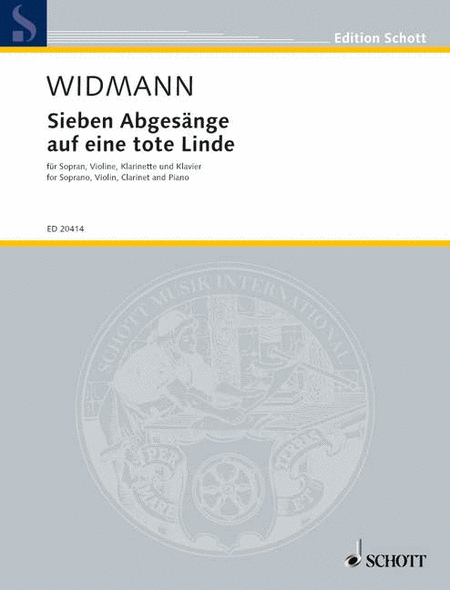Soprano, clarinet (in A and B), violin and piano - Digital Download SKU: S9.Q6718 On poems by Diana Kempff. Composed by Joerg Widmann. This edition: score and parts. Downloadable, Score and parts. Duration 18 minutes. Schott Music - Digital #Q6718. Published by Schott Music - Digital (S9.Q6718). German.Es war 1996, als mir Christoph Poppen, der damalige Leiter des MĂŒnchener Kammerorchesters, von einem kuriosen Konzert in MĂŒnsing (Ammerland) erzĂ€hlte: wĂ€hrend eines seiner Konzerte mit dem Orchester in der dortigen Kirche gab es, fĂŒr alle hör- und sichtbar, eines der gröĂten Unwetter, das die Region je gesehen hatte. Dabei schlug der Blitz ein in eine Art Wahrzeichen des Ortes, eine mehrere Jahrhunderte alte Linde. Unter den Zuhörern damals: die dort lebende Dichterin und Schriftstellerin Diana Kempff. Sie war unmittelbar erschĂŒttert vom Tod der Linde und schrieb unter diesem Eindruck einige Gedichte. Christoph Poppen wiederum war â wie in vielen anderen ZusammenhĂ€ngen auch â genialer Vermittler und stellte alsbald den Kontakt zu mir her. Die Idee: am Ort des Geschehens, in der MĂŒnsinger Kirche, solle ein Jahr spĂ€ter die UrauffĂŒhrung einer Art Requiem fĂŒr diesen Baum, der so vieles âgesehenâ hatte, erklingen. Im Rahmen der Holzhauser Musiktagen mit den Texten von Diana Kempff und meiner (noch zu schreibenden) Musik. Es gab bald eine wunderbare, sehr intensive Begegnung von Diana Kempff und mir, bei der sie etwas fĂŒr Schriftsteller nicht gerade Typisches tat: sie stellte mir frei, aus den vorliegenden Gedichten nach Belieben lediglich Teile, sogar nur Zeilenfragmente zu verwenden und auch die Reihenfolge nach meinen BedĂŒrfnissen anzuordnen und zu gestalten. Sie begriff sofort (und wĂŒnschte!), dass durch die Musik ohnehin etwas Drittes, etwas ganz Anderes entstehen wĂŒrde. Die Tatsache, dass wir Monate spĂ€ter eine sichtlich bewegte Diana Kempff auf die BĂŒhne holen durfte, freute uns alle besonders. Ihre Lyrik ist Ausdruck einer offenkundig zutiefst gequĂ€lten Seele und kommt uns oft wunderlich-versponnen entgegen. Einer zerbrechlichen Zartheit steht eine bisweilen fast brutale HĂ€rte unversöhnlich gegenĂŒber. Das Schubertâsche âFremd bin ich eingezogenâ gilt fĂŒr sie in besonderer Weise und Ă€uĂert sich in ihren Versen in einer NĂ€he zu allem Fremden (trotz des gleichzeitigen manischen Umkreisens des Eigenen und der eigenen Erinnerung), Abseitigen und auch (bei aller gleichzeitigen Skepsis) ĂbernatĂŒrlichen. Dieses geisterhaft-spukige Element versuchte ich durch meine Textauswahl und mit musikalischen Mitteln in diesen nun âSieben AbgesĂ€ngenâ zu verdeutlichen. Das erste StĂŒck ist eine karge Studie ĂŒber das Verrinnen der Zeit, das Nichts; das Zweite beschwört den Regen (den heilbringenden) herbei, der dann spĂ€ter â wenngleich mit entsetzlicher Wirkung â auch kommt. Den dritten Abgesang habe ich âTanz der toten Seelenâ betitelt; es ist ein Zwiefacher, der jedoch durch seine dĂŒster-halbseidene âWienerâ Chromatik alles LiebenswĂŒrdig-Oberbayerische lĂ€ngst verloren hat. Das klanglich vielleicht avancierteste und dichteste StĂŒck ist der vierte Abgesang, der ganz aus der Perspektive der Linde selbst erzĂ€hlt wird. Der fĂŒnfte Abgesang zu den Worten âUnd wenn der Tod so kommen magâ ist im Stile einer traurigen Volksweise bewusst schlicht gehalten. WĂ€hrend der sechste Satz in seinem expressionistischen Gestus nicht ungefĂ€hrlich das Monodram streift, ist es schlieĂlich die Seele (die ausgehauchte, die weiterexistierende?), die wörtlich den letzten Abgesang ĂŒber die BĂ€ume und die Seelen prĂ€gt. Diana Kempffs Gedichte, der Enthusiasmus Christoph Poppens, die phantastischen UrauffĂŒhrungs-Interpreten, allen voran die SĂ€ngerin Juliane Banse, haben mich zur Komposition dieser âSieben AbgesĂ€nge auf eine tote Lindeâ angeregt. Die âSieben AbgesĂ€ngeâ sind nunmehr auch eine Erinnerung an die erst jĂŒngst verstorbene Diana Kempff. Jörg Widmann, im Juni 2008.
